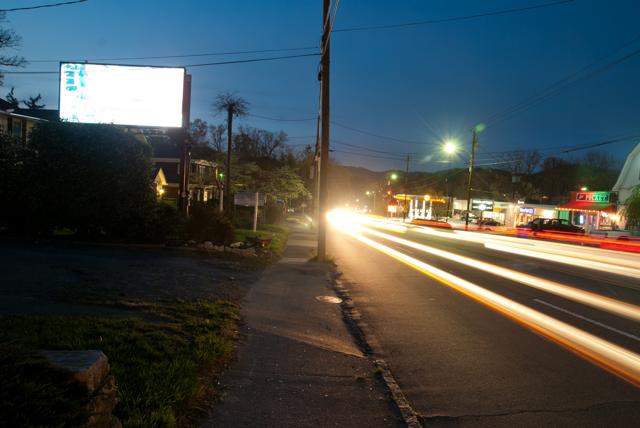Asheville has been up in arms over digital billboards in recent months, with some residents calling for an outright ban. And after months of hubbub, the matter finally made its way to City Council on March 27.
There are eight digital billboards within the city limits, all of them erected since 2008. And while Asheville has capped the total number of billboards allowed, owners may add new signs in exchange for removing existing ones. With digital billboards, 3 square feet of static billboard space must be eliminated for every square foot of digital space added. Since 2008, 45 static billboards have come down.
Nonetheless, some city residents say digital billboards are distracting, ugly and potentially dangerous. A Merrimon Avenue sign, in particular, has become a focal point for complaints.
In response, city staff proposed stricter rules for the electronic signs. After some wrangling, the Planning and Zoning Commission signed off on expanded setback requirements (including increased buffers for residential areas) and prohibiting the signs in two commercial corridors. P&Z also emphasized that staff would explore implementing even tougher rules later, but that these interim measures were intended to address the most pressing concerns.
During the public-comment period, most speakers condemned digital billboards.
“Tourism is the economic engine of this community,” Alan Escovitz declared. “Billboards intrude on the landscape of America and ruin our greatest asset: our scenic beauty.”
“Digital billboards are the second-worst thing to happen to this city in 20 years, after that fellow from out of town [now deceased state Sen. James Forrester] calling us a 'cesspool of sin,'” West Asheville resident Diane Atkins told Council.
But the billboards did find one proponent.
“With digital billboards, we're taking other billboards down, and we look forward to working with the city as we have in the past,” said General Manager Terry Graves of Fairway Outdoor Advertising, which owns four of the digital signs in Asheville. “Besides the one on Merrimon, we really haven't received any complaints.”
Digital billboards, he pointed out, have a wider range of uses than their predecessors, including helping disseminate charitable and emergency messages.
Many speakers, however, pushed for a much more stringent ban.
“The 2025 Plan is clear: There should be no new billboards unless they're along I-240, I-40 or I-26,” noted Paul Van Heden. “The elimination of billboards has precedent and has been shown to work, right here in Asheville.” He showed photos of old billboards that were eliminated during downtown revitalization.
Current state law limits municipalities' power to force unwilling sign owners to sell them existing billboards, though they can forbid new ones. So even if the city bans all digital billboards, what some critics have dubbed “the Merrimon monster” will stand.
Council member Marc Hunt, who made the motion to approve the more restrictive interim rules, also proposed a comprehensive ban.
“Now that we've experienced the impact of digital billboards, I think many citizens and leaders feel that the impact … is actually greater than the 3-to-1 trade they're allowed to make,” he said, though he thanked the outdoor advertising companies for cooperating with the city.
On separate 6-0 votes, Council members approved both the interim rules and the idea of a comprehensive ban. Mayor Terry Bellamy was absent due to campaign obligations.
The full digital billboard ban will first go to the Planning and Zoning Commission, which will work out the details. Council will probably vote on it in late May.
— David Forbes can be reached at 251-1333, ext. 137, or at dforbes@mountainx.com.




Before you comment
The comments section is here to provide a platform for civil dialogue on the issues we face together as a local community. Xpress is committed to offering this platform for all voices, but when the tone of the discussion gets nasty or strays off topic, we believe many people choose not to participate. Xpress editors are determined to moderate comments to ensure a constructive interchange is maintained. All comments judged not to be in keeping with the spirit of civil discourse will be removed and repeat violators will be banned. See here for our terms of service. Thank you for being part of this effort to promote respectful discussion.